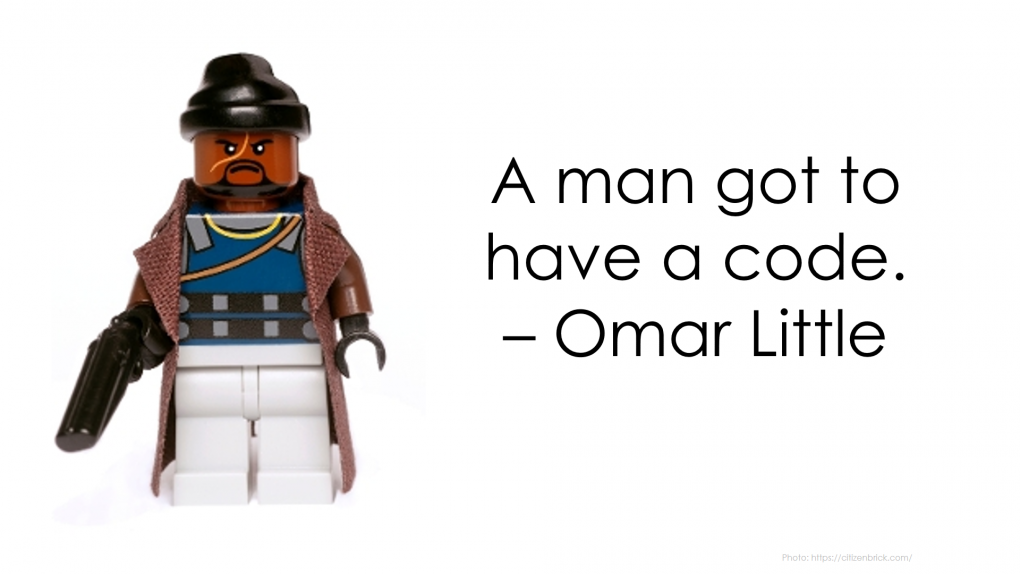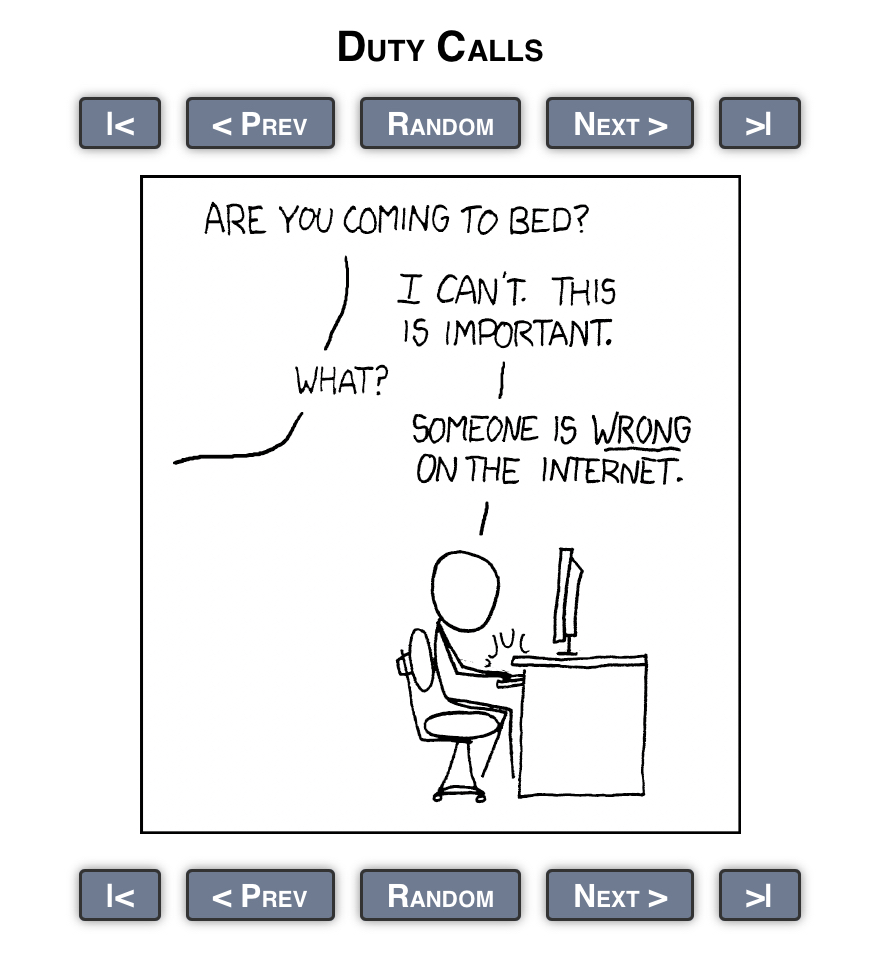Answer: I don’t.
Welp, thank you very much for coming out tonight! Don’t forget to tip your waitress, have your pets spayed and neutered, and please don’t drink and drive.
Okay, that’s not entirely true. It’s just that I used to be like this:
And now I try to be like this:
I’ve worked really hard and work really hard to maintain an even keel in my life and emotional state because when I don’t, bad things happen. But unfortunately, I spend a lot of time on the Internet and I am a person with opinions who shares them on the same Internet so I spend a lot of time being baited into fights.
I care a lot about the things I write about. A LOT. And I’m someone that thinks about a lot ethics and morality. A LOT. And generally the things I write about are greatly informed by my personal ethical code. A LOT. So when someone either has a wishy washy approach to an issue that I think is important or implies that I am somehow being less than forthright in my statements, well then…buddy, it’s on.

If you’re more of a lurker, this is the current state of the interactive parts of the internet:
(Note: I’m not sure who came up with the first iteration of this Internet conversation model, but I’m definitely copying what’s almost become a meme at this point here.)
So imagine yourself, enjoying your day, relatively minding your own business, and you decide to commit the crime of posting:
”I like apples.”
Here’s what you can expect in return.
”Oh, so you hate oranges then?”
And, rightfully, you wonder “who said anything about oranges?” Right as you go to explain that you have nothing against oranges, you were just expressing your appreciation for apples, someone chimes in with…
”How about bananas? Don’t you care about the terrible thing happening with bananas? You should be writing and giving your support to bananas instead of writing about apples.”
And you do care about the plight of the bananas! And have maybe even written about it, donated money to banana charities, and even participated in a pro-banana march! Up with bananas, man! But before you can get that out, you get hit with another notification and…
”Do you know else who like apples? Hitler.”
And then you decide to never share another opinion on the Internet ever again.
While these may seem like hyperbole, I can assure that people on the Internet don’t seem to understand a few basic things:
- Not every thing, person, or idea is in direct competition at all times with another thing, person, or idea. Indicating support for one does not mean that you hate the other.
- Many people are able to hold more than one concern in their heart and mind at one time. Honestly I wish I could worry and care about fewer things. But it’s not always possible to note the laundry list of other issues, causes, or people that you support in every communication.
- Agreeing with someone on one issue doesn’t mean I co-sign every thing that they’ve ever done or said. Also, as far as consumerism goes, it’s not always as simple for some people as it may be for you to walk away from a product or service. For example, take social media. I personally have stopped using a few services because the management made decisions that I could not ethically support. However, I know for people in various community organizing and mutual aid groups, or creatives of various stripes, there currently is not a good substitute and I understand why they have had to make the choice to stay.
I tend to post on the Internet in Hard Mode and commit the heinous crime of writing posts that challenge the status quo. So, for example, I’ll say…
”You know what, apples make a great addition to a fruit basket. Honestly, a fruit basket wouldn’t be complete without them.”
And in return I get..
”Oh so you think apples and oranges are the same thing?”
or
”You want to replace oranges!”
or
”You want to give someone an apple and tell them it’s an orange!”
or
”What do you know? You’re just a THOUGHT LEADER.”
Ouch. That one stings.
Nah, I’m just kidding, I barely clock anyone’s opinion of me let alone someone that can’t discuss a subject without resorting to ad hominem arguments.
It’s not that I think ALL hierarchies are bad, I just point out when they’re unnecessary and maybe a making distinction between entities (or not!) is more appropriate.
If I had to guess, I think all of these responses are rooted in people limiting their imaginations by assuming an artificial scarcity is real. My ability to value and respect people is infinite. Just because I value the contribution or effort of one group, that does not mean that I lessen my appreciation of the other. Nor does it mean that I don’t see differences between the two groups and appreciate the need for different requirements for different roles. I’m not trying to make orange juice out of apples. I’m just wondering why anyone would think apple juice isn’t as good as orange juice.
The other problem with arguing with people on the Internet is that there is no neutral arbitrator to declare a winner or loser. Also people assume there HAS TO BE a winner and a loser and that a new appreciation for the view of the other person, even if you don’t share it, can be considered a success. So it mostly seems that people just keep going until they wear the other person out and the last person standing “wins.”
(And no, obviously I’m not including “debates” about the humanity of another person or similar. Some topics are not up for debate and some people are not worth debating.)
Social media presents us with such an amazing opportunity to educate (or be educated) and maybe even reach a mutual understanding or appreciation of someone with another viewpoint and it’s mostly wasted on people trying to score points in an imaginary game that exists only in their head.
So how do I stay cool as cool as the bottom side of the pillow?
Well, for one, I have developed a pretty good sixth sense of which way a conversation is gonna go within one or two replies. As soon as someone starts in with one of the fallacies like the one above, ESPECIALLY if it’s a personal attack, I check out.
It’s also important to remember that there isn’t a chess timer and I don’t have to respond immediately. Pretty much everything dumb I’ve ever said on the internet that I came to regret was said in a moment of passion and without thinking it through. Post in haste, repent in leisure, as it were.
When I do find myself becoming emotional – and this is a neat trick I learned in therapy – I try to pause and (1) try to figure out exactly what emotion I’m actually feeling (e.g. anger, shame, embarrassment, fear, etc) (2) see if I can determine what the cause of that emotion is (does the person have a point? Am I worried people think that about me?) And then (3) depending on the feeling, either acknowledging it and carrying on or tapping out either permanently or temporarily.
And I guess finally, I try to treat people the way I’d like to be treated. I try to not assume the motivations of why someone is expressing a certain opinion. I try to believe that everyone is acting in good faith and doing the best they can. But at the end of the day, it’s up to everyone individually to figure out what they believe and what they need to do. I have my boundaries and if someone is unable participate in a constructive way, I’m under no obligation to destroy my peace of mind so that they can rant at me.
I’m fond of ending my more spicy short form social media posts with “don’t argue with me, go argue with your momma” and I mean it, except you should probably treat your momma nicer than that.





